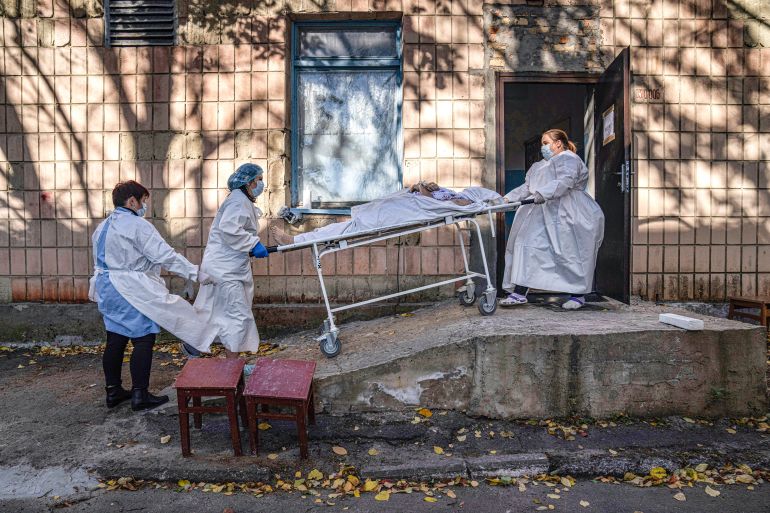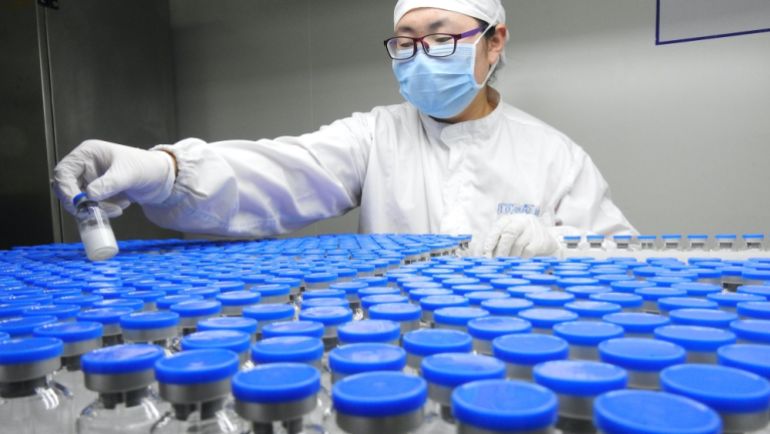
Could COVID-19 mRNA vaccines also fight cancer? | Drugs News
The mass-produced COVID-19 vaccines built using the mRNA model – which were rapidly manufactured during the global pandemic – could also help the immune system recognise and attack cancer tumours, new studies have shown.
Studies in mice and an analysis of medical records of cancer patients – who received mRNA shots for COVID-19 before starting immunotherapy for cancer treatment – revealed a startling pattern: the vaccinated patients lived significantly longer than those who had not received the shots.
A team of researchers from the University of Florida and the University of Texas MD Anderson Cancer Center presented the results this week at the European Society for Medical Oncology Congress in Berlin and published in the peer-reviewed journal, Nature.
The results, they say, reveal that the mRNA vaccines do not just prevent infection – they also “wake up” and prompt the body’s immune system to fight tumours.
The discovery has come at a time when US President Donald Trump’s administration has slashed funding for mRNA research.
So, why is this being touted as groundbreaking? What does it mean for cancer patients? And how did the COVID-19 pandemic become the medium for this unlikely discovery?
What is an mRNA vaccine?
Unlike traditional vaccines, which used weakened or inactive parts of a virus to trigger the immune system to build a defence, mRNA vaccines deliver a small strand of genetic code known as “messenger RNA” directly into the body’s cells.
The cell reads this blueprint as an instruction to manufacture a spike protein which mimics that of the virus, and display it on its surface, effectively waving a red flag that alerts the immune system to build a defence.
The body then creates antibodies and memory cells trained to recognise and attack that protein spike if it ever appears again.
How did researchers discover the link between mRNA and cancer?
This is an area of research which has been going on for some years, most notably by paediatric oncologist Elias Sayour, the Stop Children’s Cancer/Bonnie R Freeman Professor for Pediatric Oncology Research at the University of Florida, in the United States.
The COVID-19 pandemic presented a particular opportunity to study the implications of mRNA for cancer treatment as the world moved en masse to vaccinate the population.
When Sayour’s former student, oncologist Adam Grippin, examined clinical data of more than 1,000 patients treated between August 2019 and August 2023 at the MD Anderson Cancer Center, he found a striking pattern.
People who had received a COVID-19 mRNA vaccine within 100 days of starting immunotherapy lived significantly longer than those who received the same medical treatment but did not have the vaccine.

How much longer did people live with the vaccine?
For patients with advanced lung cancer, the median survival rate nearly doubled if they had the vaccine, rising from 20.6 months to 37.3.
More strikingly, the survival improvements were most pronounced in patients with immunologically “cold” tumours – meaning that the mRNA vaccine appeared to “wake up” the immune system in patients with these harder-to-treat cancers – turning “cold” tumours into ones the immune system could more easily recognise and attack.
The researchers noted that their findings were consistent across varying factors, such as different vaccine manufacturers, doses and time of vaccination.
The researchers also compared the survival rates in a smaller group of patients receiving immunotherapy for metastatic melanoma, the most advanced stage of a type of skin cancer. In the study, 43 patients had an mRNA COVID vaccine and 167 did not.
Patients who did not receive the vaccine had a median survival of just more than two years. By contrast, those who were vaccinated before starting treatment had not yet reached their median survival point more than three years into follow-up, the research found.
How does it work?
The researchers discovered that mRNA vaccines work like an alarm for the body’s defence system.
When the vaccine is given, it puts the immune system on alert, making it more likely to notice cancer cells that it might have ignored before. Once the immune system is activated, it begins to attack these cells.
But cancer cells fight back. They produce a protein called PD-L1, which works as a shield that “hides” them from the immune system. However, there are drugs known as immune checkpoint inhibitors that can block this shield.
When both the vaccine and these drugs are used, it creates the ideal situation – the immune system is active and alert, and the cancer’s defences are down, Grippin explained.
While the researchers said that they do not yet fully understand the mechanisms, the findings suggest that mRNA vaccines can be used to re-programme immune responses to cancer.

What does this mean for cancer patients?
These findings are preliminary. If, however, the study is validated in clinical trials, it could have huge implications for the treatment of cancer.
“These vaccines produce powerful anti-tumour immune responses that are associated with massive improvements in survival for patients with cancer,” Grippin said.
“The implications are extraordinary – this could revolutionise the entire field of oncologic care,” said Sayour. “We could design an even better nonspecific vaccine to mobilise and reset the immune response, in a way that could essentially be a universal, off-the-shelf cancer vaccine for all cancer patients.”
Grippen, who co-led the study with Steven Lin, professor of radiation oncology, said his team is launching a Phase 3 clinical trial to confirm the initial results and investigate whether COVID mRNA vaccines should be made part of the standard of care for patients.
What did scientists find in tests with mice?
In the mouse experiments, researchers found that injecting an mRNA COVID vaccine directly into a tumour made dendritic cells – a type of white blood cell – more alert.
Once the dendritic cells picked up on presence of the tumour, they sent out signals that attracted T cells to come and attack it. In some mice, this helped slow the growth of the cancer.
But there’s a big catch. Not everyone naturally has T cells that are capable of killing cancer cells. For some people, their immune system can tell that a tumour is dangerous, but their specific T cells do not know how to destroy it.
That’s one reason why immunotherapies – treatments that boost the immune system to fight cancer – work for some patients but not for others.
Having an mRNA COVID vaccine will not make your body produce new tumour-fighting T cells. What it might do, based on this early research, is make dendritic cells more likely to notice a tumour and effectively deploy the T cells.
First Appeared on
Source link






